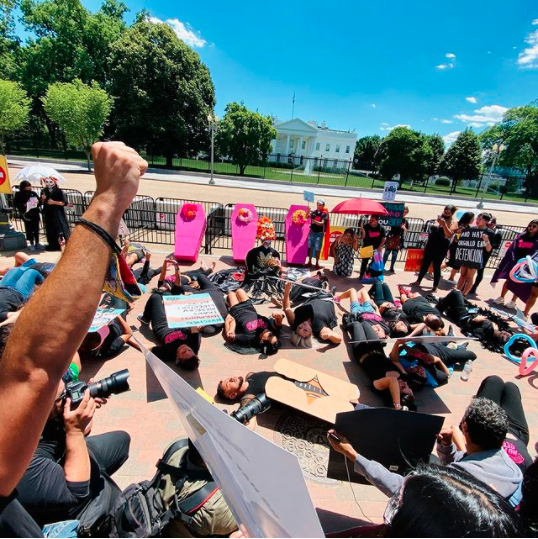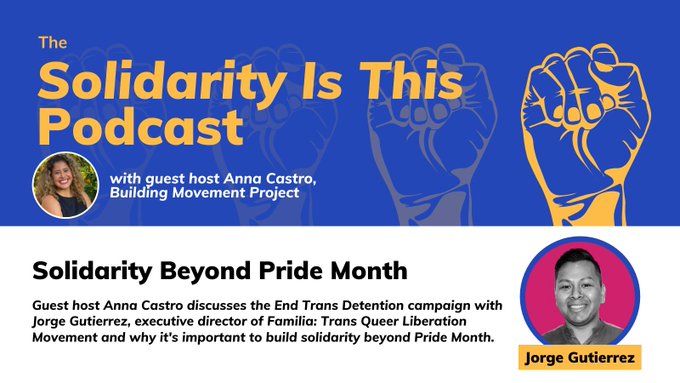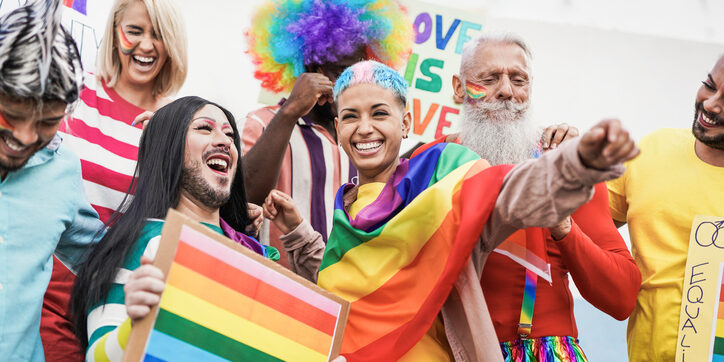Anna Castro, SolidarityIs | June 30, 2021 This blog was written by and originally posted on June 24, 2021, on The Building Movement Project Blog. I attended my first Pride event during my junior year of high school. I told my mother I was visiting museums in Downtown Los Angeles when I had actually sneaked out to meet up with friends in West Hollywood, California to watch the parade. Watching Black and brown people gather en masse to celebrate being a part of the LGBTQ community triggered a lot of emotions for me, but at that time what most urgently rang through was hope. I’d grown up in an extremely religious household with two immigrant parents who had a hard enough time understanding their fiercely independent American child. The world that I wanted to live in was one in which everyone received dignity, care, and respect no matter what. Son La Lucha: “We Stand in Solidarity with Transgender Community” Pride was a glimpse into what it could look like. Over the years, as I have charted a journey in social change work, my vision of solidarity is inspired by the struggle for liberation and the expression of joy that I continue to find in queer and trans communities. This year, Pride Month is coupled with other symbolic markers. June is also Immigrant Heritage Month, and due to recently passed legislation, Juneteenth is a federal holiday. To turn symbolic commemorations into actual systems and policy change, we must have a vision and practice of co-liberation. How can the triad of markers this month propel us towards a vision of co-liberation? How do we uplift and advocate for the demands of people affected by different systems of oppression? For those of us navigating these shared histories and lived experiences beyond June, can we celebrate and make space to grieve what was taken from us? I asked Jorge Gutierrez, executive director of Familia: Trans Queer Liberation Movement, these questions on the upcoming episode of the Solidarity Is This podcast. Jorge brought home the idea of co-liberation when he said: “We can’t have Pride when we have folks who are in detention.” That’s why Jorge and Familia are part of the End Trans Detention Campaign. This week, along with Black LGBTQIA+ Migrant Project, Transgender Law Center, Mijente, and several other LGBTQ and Latinx organizations, they took their demands to Washington, D.C. Their direct action included “a service honoring and mourning the deaths of several trans people who died due to ICE [Immigration & Customs Enforcement] negligence.” As a disruptor and undocumented youth organizer turned executive director, Jorge and a few others created a campaign where the complexity of being an immigrant and part of the LGBTQ community was celebrated and the demands of trans people would be centered. Through the End Trans Detention Campaign, they are making an important intervention in the narrative around immigration in the United States as well as within the broader immigrant rights movement. Jorge goes on, “We’re not monolithic when we’re talking about immigrant communities in the U.S. There are black immigrants, LGBT folks, disabled folks, single parents who are being detained, young people.” Jorge also brought up the importance of fighting for liberation for all. Because most communities are not a monolith, the public victory of one part of the community should not stop the push to uplift all members of the community. He noted: “If the visibility is not making the door wider for more people to come through and be able to have their lives be dignified and respected and everything that comes with that, then I don’t know what kind of purpose that visibility really does for anybody.” In our podcast interview, I closed out the episode by asking Jorge to imagine in his ideal world, what the immigration system in the United States would look like. I asked him to think beyond the scope of the To learn more about The Building Movement Project, SolidarityIs, partnership opportunities, or other ways you can support our work, email [email protected] or visit our website and complete the “contact us” form. Anna has extensive experience spearheading strategic communications campaigns. Her past work includes fighting back against the disenfranchisement of formerly incarcerated people in California, reuniting families separated by deportations, and turning out the Latinx vote in battleground states. Most recently, as the senior communications manager at Transgender Law Center she demanded #JusticeforRoxsana, a transgender woman from Honduras who died in ICE custody, and launched the Trans Agenda for Liberation, a blueprint for liberation for all. She’s previously worked for Mi Familia Vota, the ACLU of California Voting Rights Project, and the ACLU of San Diego & Imperial Counties. The proud daughter of Salvadoran and Peruvian immigrants, Anna is a first-generation college graduate with a Bachelor’s Degree in Black Studies from Amherst College. To learn more about Anna and SolidarityIs, feel free to reach out to her through email at [email protected] or on Twitter at @apcastro16. We understand the unique opportunities and challenges of the nonprofit sector. From helping organizations with leadership transitions to steering community-based organizations past a roadblock, we guide nonprofits in their journeys towards making impactful, lasting change. Through our work in three distinct areas – leadership, service and social change, and movement building – we push organizations to ask difficult questions and offer productive tools to guide them through the process of seeking answers. BMP ignites nonprofits’ potential to have an impact in advancing movements for progressive social change and focuses that potential into tangible action through Listening and Learning, Leading and Influencing, and Consulting and Training. To learn more about The Building Movement Project, SolidarityIs, partnership opportunities, or other ways you can support our work, email [email protected] or visit our website and complete the “contact us” form. Follow The Building Movement Project on Social Media on Instagram, Facebook, and Twitter to stay up to date with news, upcoming events, and initiatives.

 legislation, beyond the framework of citizenship, what it would feel like for an LGBTQ immigrant to navigate this system. I am excited to share more of his wisdom and the answer to that question in the upcoming release of our podcast episode. You can subscribe to the podcast here. Please also visit www.endtransdetention.org to take action and learn more about how to demand Justice for Victoria Arellano, Roxsana Hernandez, and Johana Medina.
legislation, beyond the framework of citizenship, what it would feel like for an LGBTQ immigrant to navigate this system. I am excited to share more of his wisdom and the answer to that question in the upcoming release of our podcast episode. You can subscribe to the podcast here. Please also visit www.endtransdetention.org to take action and learn more about how to demand Justice for Victoria Arellano, Roxsana Hernandez, and Johana Medina.
More about the author
 Anna Castro – (she/her/hers) is the Manager of SolidarityIs with the Building Movement Project, where she focuses on strengthening cross-movement bridges, training emerging movement and nonprofit leaders on using solidarity as a strategy to cultivate power, and storytelling that centers the collective resilience of our people. She’s worked as a consultant with Deepa Iyer on the SolidarityIs project since 2018.
Anna Castro – (she/her/hers) is the Manager of SolidarityIs with the Building Movement Project, where she focuses on strengthening cross-movement bridges, training emerging movement and nonprofit leaders on using solidarity as a strategy to cultivate power, and storytelling that centers the collective resilience of our people. She’s worked as a consultant with Deepa Iyer on the SolidarityIs project since 2018.
More about The Building Movement Project
 The Building Movement Project (BMP) supports and pushes the nonprofit sector to tackle the most significant social issues of our times by developing research, creating tools and training materials, providing guidance, and facilitating networks for social change. With over two decades of experience, the BMP team understands the short- and long-term effects of social and political change on the nonprofit sector. Our research and consulting services draw on our expertise to help organizations navigate internal and external changes, build greater momentum, and achieve new victories.
The Building Movement Project (BMP) supports and pushes the nonprofit sector to tackle the most significant social issues of our times by developing research, creating tools and training materials, providing guidance, and facilitating networks for social change. With over two decades of experience, the BMP team understands the short- and long-term effects of social and political change on the nonprofit sector. Our research and consulting services draw on our expertise to help organizations navigate internal and external changes, build greater momentum, and achieve new victories.
Share this:







